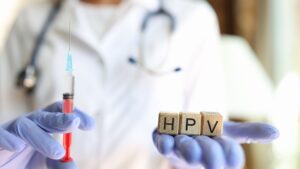
Human Papillomavirus (HPV) is a group of viruses that infect human skin and the moist membranes lining parts of the body, such as the cervix, anus, mouth, and throat. There are over 100 different types of HPV, and they are classified as either low-risk or high-risk based on their potential to cause cancer.
- Transmission: HPV is primarily transmitted through skin-to-skin contact, most commonly through sexual activity, including vaginal, anal, and oral sex. It can also be spread through non-sexual means, such as from mother to child during childbirth or through touching infected skin.
- Symptoms: In many cases, HPV infections do not cause any symptoms and go away on their own. However, certain high-risk types of HPV can lead to abnormal cell changes, which may eventually result in various cancers, such as cervical, anal, vulvar, vaginal, penile, or throat cancer.
- HPV and Cancer: HPV is a leading cause of cervical cancer. Persistent infection with high-risk HPV types can lead to precancerous cell changes in the cervix, which, if left untreated, may progress to cervical cancer. HPV is also associated with other cancers, as mentioned earlier.
- Prevention: The most effective way to prevent HPV infections is through vaccination. HPV vaccines are available and recommended for both males and females, usually given during the pre-teen or early teenage years. The vaccine targets the most common high-risk HPV types and some low-risk types that cause genital warts.
- Screening and Detection: Regular cervical cancer screenings, such as Pap smears or HPV tests, are essential for early detection of cervical abnormalities caused by high-risk HPV. Early detection and treatment of precancerous cells can prevent the development of cervical cancer.
- Treatment: There is no cure for HPV itself, but in most cases, the infection clears on its own without causing any harm. Treatment focuses on managing symptoms and addressing any related health issues, such as genital warts or abnormal cell changes.
- Safer Sex Practices: Practicing safer sex, such as using condoms or dental dams, can reduce the risk of HPV transmission. However, since the virus can also infect areas not covered by condoms, they may not provide complete protection.
It’s important to note that HPV is very common, and most sexually active individuals will contract it at some point in their lives. Most infections are harmless and resolve spontaneously, but regular check-ups and early detection are crucial in preventing the development of serious health issues. If you have concerns about HPV or its potential impact on your health, it is best to consult a healthcare professional for personalized advice.
Don’t put your health on the back burner – take the first step towards a healthier and happier you. Schedule your appointment with Comprehensive Ob-Gyn today by calling (954) 753-2411 or visiting our website www.compobgyn.com.
Together, we can ensure that you remain in the best possible health and continue to thrive in all aspects of your life. Remember, your health matters – and we are here to help you prioritize it!


